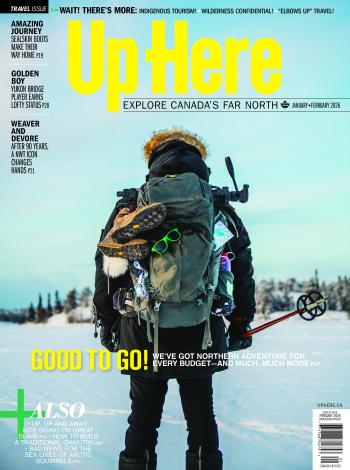If you drive seven minutes out of downtown Whitehorse up Robert Service Way, past a carwash and behind a garden centre, you’ll find what feels like a secret. Hidden in the trees is Whitehorse’s newest accommodation: The Black Spruce hotel. Here’s what makes it special. The Black Spruce is a “landscape hotel,” a growing, international concept that puts minimal environmental impact and maximum connection to nature front and centre in hotel design, construction and, most important, guest experience.
The Black Spruce—the first landscape hotel in the Yukon, and likely the North—is the brainchild of Laird Herbert, a former house-framer and tiny-house builder. On a mid-September morning, sunlight filters through the trees as he offers a guided tour of the facility, starting on a cedar boardwalk that leads up to four black boxy units, built at varying heights, atop chunks of granite that jut up from the earth.
Herbert explains that he was inspired by the Juvet Landscape Hotel, a remote luxury accommodation in Norway. Like the Juvet, the Black Spruce is outdoor-oriented, with beds, kitchens, and bathrooms facing expansive windows that look out onto the forest. “The idea is that guests are situated in nature,” he says. “Instead of staying in a more typical hotel room, you're just in the woods and you have a feel for the surrounding environment.”
Herbert may be a pioneer in northern landscape hoteliery, but his ideas tap into broader issues in the tourism industry. After years of record growth, the impact of travel on climate change and over-tourism has become impossible to ignore, seeding serious discussions about the sector’s environmental and social footprint. “How do we make tourism not just an industry or business, but to really tap into the ability of tourism to help reshape society to make it better,” says Blake Rogers, executive director of the Tourism Industry Association of the Yukon, framing the issues. “[What can we do] to help promote culture, and to help have people experience and care and be connected to the environments in places that they go to.”
From that point of view, the ethos of the Black Spruce dovetails with a growing interest in sustainable travel and may prove helpful as Herbert works through his business’s own pandemic recovery. He began construction with a crew in May 2019 and worked through the winter, aiming for a spring opening. COVID-19 turned those plans to ash. “It was the worst timing,” he says. He laid off the crew and pushed the Black Spruce’s opening to Oct. 15. Now, instead of renting out all four units as nightly accommodations, he’s taken on two monthly tenants and will rent out the other two units on a per-night basis.
Fortunately, his financer, the Yukon First Nations-owned Däna Näye Ventures, paused repayments when the pandemic hit. “They were actually invaluable because as a startup, there's no history, right?” Herbert says. “It’s kind of an unproven business idea. There are not a lot of units either, which is a little bit nerve-wracking for investors.”
Despite the challenges, Herbert is persisting with his entrepreneurial ambitions. Originally from Enderby, B.C., he worked for both Yukon College (now Yukon University) and Yukonstruct before deciding to go out on his own. “In Whitehorse there's been this little resurgence of small business, which is really cool,” he says, mentioning Polarity Brewing and Bullet Hole Bagels as examples. “When I first moved up here, it was sort of a government job or nothing.” That inspired him, as did his time at Yukonstruct’s Makespace at the NorthLight Innovation building, where he was surrounded by entrepreneurs and big ideas.
Herbert’s own ideas are visible in the Black Spruce. The black siding is burnt wood—a natural preservation technique out of Japan called shou sugi ban. He and an employee burnt the Yukon spruce themselves last winter. With wire, they tied three 16-foot boards together to form a triangular chimney of sorts, then lit newspaper in the bottom and watched as flames shot out from the top into the sky. Burning the wood like this means it should never need to be treated again.
Since the hotel is built on rock—and given the landscape hotel philosophy— underground plumbing wasn’t an option. Herbert and crew had to build a utilidor, an insulated above-ground box that carries water and septic from the units to a holding tank more than 75 metres away. “I think it’s actually the first one in Whitehorse that's been approved,” he says.
These aren't the only unconventional features: the north wall of each unit is packed with straw bales for insulation. Herbert also used dense-packed cellulose, a popular technique in passive-house construction—the goal of which is to capture as much of the sun’s heat as possible.
“I really like natural building and it fits well with that idea of trying to make it as environmentally friendly as possible,” he says. “There's very little toxic stuff, which is kind of an ambitious effort because a lot of building materials are not great on the chemical side.” Inside, for instance, the walls are clad in kaolin clay plaster.
Then there are the finer details. In the foyer, marble tiles with chunks of quartz sparkle in the sun. The shower in the tiny bathroom features luxe black-and-white tiles. And on the roof of the laundry house, Herbert planted wild crocus and lupin.
Given the range of accommodations in the Yukon—from downtown hotels to off-grid cabins, the Black Spruce sits somewhere in the middle. It’s modern and upscale, but in a quiet, forested setting right in the city. Herbert hopes it will appeal to visitors who travel to the Yukon for the wilderness, as well as people who are interested in design. The idea is that staying in a landscape hotel is an attraction in itself. “I'm curious to see how it goes,” he says, laughing. “A lot rides on it.”










